中国禁忌 Chinese Taboos
中西方禁忌(Taboos between China and Western countries)
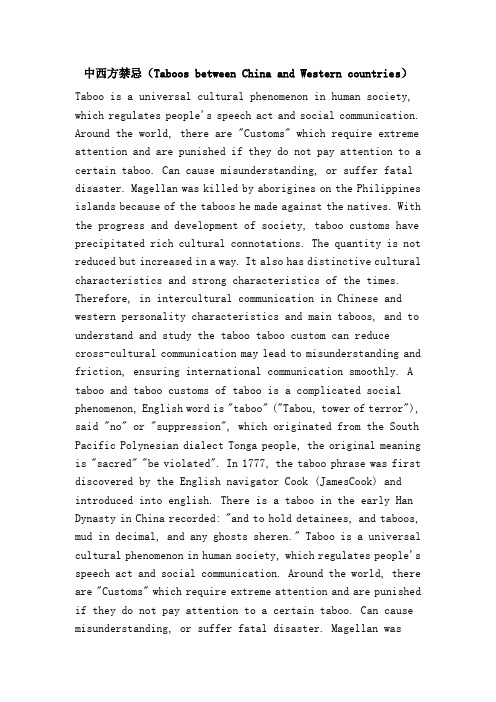
中西方禁忌(Taboos between China and Western countries)Taboo is a universal cultural phenomenon in human society, which regulates people's speech act and social communication. Around the world, there are "Customs" which require extreme attention and are punished if they do not pay attention to a certain taboo. Can cause misunderstanding, or suffer fatal disaster. Magellan was killed by aborigines on the Philippines islands because of the taboos he made against the natives. With the progress and development of society, taboo customs have precipitated rich cultural connotations. The quantity is not reduced but increased in a way. It also has distinctive cultural characteristics and strong characteristics of the times. Therefore, in intercultural communication in Chinese and western personality characteristics and main taboos, and to understand and study the taboo taboo custom can reduce cross-cultural communication may lead to misunderstanding and friction, ensuring international communication smoothly. A taboo and taboo customs of taboo is a complicated social phenomenon, English word is "taboo" ("Tabou, tower of terror"), said "no" or "suppression", which originated from the South Pacific Polynesian dialect Tonga people, the original meaning is "sacred" "be violated". In 1777, the taboo phrase was first discovered by the English navigator Cook (JamesCook) and introduced into english. There is a taboo in the early Han Dynasty in China recorded: "and to hold detainees, and taboos, mud in decimal, and any ghosts sheren." Taboo is a universal cultural phenomenon in human society, which regulates people's speech act and social communication. Around the world, there are "Customs" which require extreme attention and are punished if they do not pay attention to a certain taboo. Can cause misunderstanding, or suffer fatal disaster. Magellan waskilled by aborigines on the Philippines islands because of the taboos he made against the natives. With the progress and development of society, taboo customs have precipitated rich cultural connotations. The quantity is not reduced but increased in a way. It also has distinctive cultural characteristics and strong characteristics of the times. Therefore, in intercultural communication in Chinese and western personality characteristics and main taboos, and to understand and study the taboo taboo custom can reduce cross-cultural communication may lead to misunderstanding and friction, ensuring international communication smoothly. A taboo and taboo customs of taboo is a complicated social phenomenon, English word is "taboo" ("Tabou, tower of terror"), said "no" or "suppression", which originated from the South Pacific Polynesian dialect Tonga people, the original meaning is "sacred" "be violated". In 1777, the taboo phrase was first discovered by the English navigator Cook (JamesCook) and introduced into english. There is a taboo in the early Han Dynasty in China recorded: "and to hold detainees, and taboos, mud in decimal, and any ghosts sheren." tabooIncluding the nature, natural objects (stars, lightning) as a sacred form about their taboos and behavior; of some animals and plants taboo; worship of ancestors and gods, the gods and ancestors have symbolic relics taboo [1], also formed in interpersonal relationships in the long-term taboo customs. Freud, a famous psychologist in Austria, made a deep study of the cultural phenomenon of taboo in his book totem and taboo. In his view, Tab (taboo), in our view, it represents two different aspects of meaning. First of all, it's "mysterious", "dangerous", "forbidden", and "unclean"". The opposite of Tabin Polynesian language is "NOA", which means "popular" or "usually approachable". So, that means a taboo have been restricted or prohibited and can not touch the nature of things exist. We usually say "sacred person or thing" in meaning and has some of the same tower [2]. Generally passed through oral inheritance and social demonstration. "Taboos are almost everywhere. In the same culture,Taboos differ and differ because of regional or sub cultural differences. Taboos vary much in different cultures." [3] taboos involve speech acts, and if you do not pay attention to or disrespect each other's taboos, it is easy to hurt each other's feelings. Because of this, more people taboo communication, especially cross-cultural communication is a sort of a small obstacle. Taboo refers to violations of the expectations of the society, it not only comes from the people of some mysterious force of fear, but also contains people in the long-term accumulation of experience in the struggle with nature, and formed in interpersonal communication in the long-term social etiquette. Taboo customs vary according to nationality, society, culture, region, occasion and so on. Therefore, people must be very sensitive to taboos incross-cultural communication and have to study it. They have to pay attention to it and have to avoid it in order to communicate smoothly. Two, the taboo characteristics of Chinese and Western taboos are the common cultural phenomena of different ethnic groups in the world, but the content and form of taboos are different. Taboos, as a kind of non behavioral normative folk customs, are closely related to the cultural characteristics and traditions of the society in which taboos are based. In the course of human history, the samenation usually has a common spiritual structure, value system, psychological characteristics and behavior patterns, and it is in this common cultural background that they have a sense of belonging and identity. The dialectics of Chinese classical philosophy emphasizes the harmony and interpenetration of opposites, that is, unity in opposites, and the whole world is a unity. The book of changes uses the interaction of two opposing forces, yin and Yang, to explain the development and change of things. Chinese traditional culture emphasizes the harmony between man and nature as a whole. "Harmony" in the political field is the spring and autumn unified concept, on ethical performance for the overall situation; in terms of value, although the ancient China is private ownership, but on the relationship between individual and society still emphasize collectivism, value orientation in order to safeguard the overall interests of the. With the changes of the times, the phenomenon of taboo which reflects the patriarchal clan system and hierarchy has disappeared. But there are still taboos in appellation. The dialectics of western philosophy is similar to the dialectics of Chinese classical philosophy. Heraclitus, an ancient Greek philosopher, also believes that the world is a harmonious unity. However, the 14 sixteenth Century European Renaissance and religious reform is like a star in the night of seventeenth Century; Newton and other scientists reveal the secrets of the universe, inductive reasoning observation, Bacon advocated the scientific research as the hard facts; eighteenth Century cultural enlightenment movement swept Europe and the United States, national independence, democracy and Republic, within the in the 21st century, "the world is a philosophy in the unity of opposites", the pursuit of "freedom and equality" and "civil rights, thepeople" concept and "individual struggle" in the western society is deeply rooted in the hearts of "individual standard" consciousness as the mainstream consciousness. For the pursuit of freedom and human rights, the concept of "privacy" (Privacy) in personal life is extremely developed, and privacy has become an important content of taboos. In this colorful folk culture, some factors vary from culture to culture, western culture is likely to be highly appreciated from the Chinese culture, and Chinese culture of "bad habits" may be as unalterable principles in western culture. Some topics are popular in Chinese culture, but in Western cultures it may constitute a violation of privacy. "When in Rome, do as the Romans do" is a must. Three, the taboos of Chinese and western social taboos mainly exist in all aspects of human social interaction. Chinese and Western English speaking countries have different social taboos because of different cultural backgrounds, cultural traditions, religious beliefs and different hierarchical concepts. 1. self esteem and privacy incross-cultural communication, involving Chinese self-esteem or "face" and Westerners privacy issues is absolutely not openly asked, otherwise it will be regarded as rude and disrespectful. The Chinese people pay most attention to "face"". In Chinese culture, "face" is a symbol of status, identity, honor and self-respect. Chinese saying "don't hit the face,Don't speak Jieduan, Chinese the biggest taboo is related to personal dignity "weaknesses" and "pain" and "shortcomings" "wrong" and so on. Chinese people are good at face, criticism can not be mentioned directly, but should be expressed in a tactful way. No evil human nature concept in China. For the personality cultivation of the heart should be mature and timesof day. Instead of trying hard to improve one's own character, but to pay attention to the faults of others, just as a stone hits his own foot, society will come to the concept of "disgrace" and so on。
中国风俗禁忌英文作文
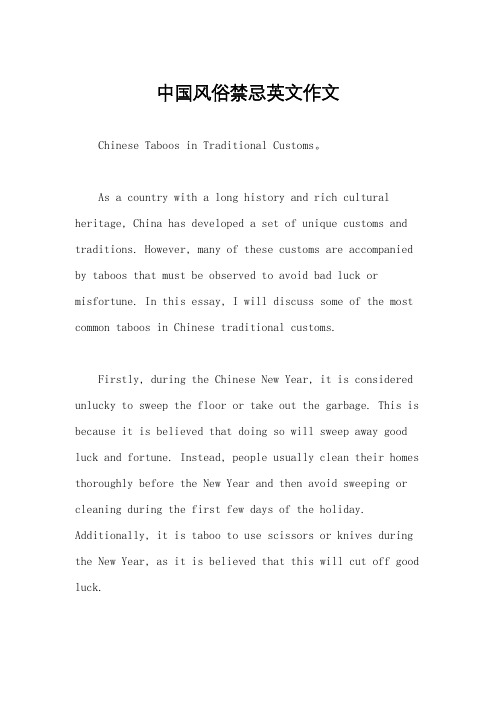
中国风俗禁忌英文作文Chinese Taboos in Traditional Customs。
As a country with a long history and rich cultural heritage, China has developed a set of unique customs and traditions. However, many of these customs are accompanied by taboos that must be observed to avoid bad luck or misfortune. In this essay, I will discuss some of the most common taboos in Chinese traditional customs.Firstly, during the Chinese New Year, it is considered unlucky to sweep the floor or take out the garbage. This is because it is believed that doing so will sweep away good luck and fortune. Instead, people usually clean their homes thoroughly before the New Year and then avoid sweeping or cleaning during the first few days of the holiday. Additionally, it is taboo to use scissors or knives during the New Year, as it is believed that this will cut off good luck.Secondly, in Chinese culture, the number four is considered unlucky because it sounds like the word for death. Therefore, it is taboo to give gifts in sets of four or to have four people sitting at a table. Similarly, the number eight is considered lucky because it sounds like the word for prosperity. Many Chinese people will choose phone numbers or license plate numbers with multiple eights.Thirdly, in Chinese weddings, it is considered taboofor the bride and groom to see each other before the ceremony. Additionally, the color white is associated with funerals and death, so it is not a traditional color for wedding dresses. Instead, brides typically wear red, whichis a symbol of good luck and happiness.Finally, in Chinese funerals, it is taboo to wearbright colors or to celebrate with alcohol. The color white is the traditional color of mourning, and it is also common to wear black or dark colors. Additionally, it isconsidered disrespectful to laugh or smile during a funeral, as it is a solemn occasion.In conclusion, Chinese traditional customs are accompanied by many taboos that must be observed to avoid bad luck or misfortune. These taboos are deeply rooted in Chinese culture and are still observed by many people today. By understanding and respecting these customs and taboos,we can gain a better appreciation of Chinese culture and traditions.。
中国语言禁忌
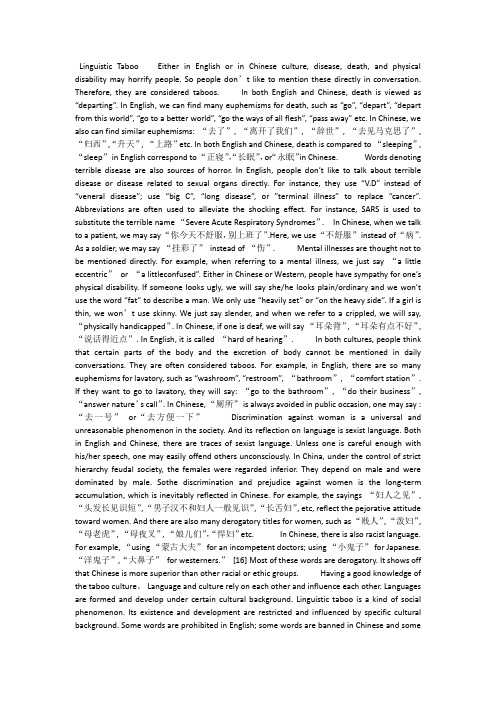
Linguistic Taboo Either in English or in Chinese culture, disease, death, and physical disability may horrify people. So people don’t like to mention these directly in conversation. Therefore, they are considered taboos. In both English and Chinese, death is viewed as “departing”. In English, we can find many euphemisms for death, such as “go”, “depart”, “depart from this world”, “go to a better world”, “go the ways of all flesh”, “pass away” etc. In Chinese, we also can find similar euphemisms: “去了”, “离开了我们”, “辞世”, “去见马克思了”, “归西”,“升天”, “上路”etc. In both English and Chinese, death is compared to “sleeping”, “sleep”in English correspond to “正寝”,“长眠”,or“永眠”in Chinese. Words denoting terrible disease are also sources of horror. In Englis h, people don’t like to talk about terrible disease or disease related to sexual organs directly. For instance, they use “V.D” instead of “veneral disease”; use “big C”, “long disease”, or ”terminal illness” to replace “cancer”. Abbreviations are often used to alleviate the shocking effect. For instance, SARS is used to substitute the terrible name “Severe Acute Respiratory Syndromes”. In Chinese, when we talk to a patient, we may say “你今天不舒服,别上班了”.Here, we use “不舒服”instead of “病”. As a soldier, we may say “挂彩了”instead of “伤”. Mental illnesses are thought not to be mentioned directly. For example, when referring to a mental illness, we just say “a little eccentric”or “a little confused”. Either in Chinese or Western, people have sympathy for one’s phy sical disability. If someone looks ugly, we will say she/he looks plain/ordinary and we won’t use the word “fat” to describe a man. We only use “heavily set” or “on the heavy side”. If a girl is thin, we won’t use skinny. We just say slender, and when we refer to a crippled, we will say, “physically handicapped”. In Chinese, if one is deaf, we will say “耳朵背”, “耳朵有点不好”, “说话得近点”. In English, it is called “hard of hearing”. In both cultures, people think that certain parts of the body and the excretion of body cannot be mentioned in daily conversations. They are often considered taboos. For example, in English, there are so many euphemisms for lavatory, such as “washroom”, “restroom”, “bathroom”, “comfort station”. If they want to go to lavatory, they will say: “go to the bathroom”, “do their business”, “answer nature’s call”. In Chinese, “厕所”is always avoided in public occasion, one may say :“去一号”or“去方便一下”Discrimination against woman is a universal and unreasonable phenomenon in the society. And its reflection on language is sexist language. Both in English and Chinese, there are traces of sexist language. Unless one is careful enough with his/her speech, one may easily offend others unconsciously. In China, under the control of strict hierarchy feudal society, the females were regarded inferior. They depend on male and were dominated by male. Sothe discrimination and prejudice against women is the long-term accumulation, which is inevitably reflected in Chinese. For example, the sayings “妇人之见”, “头发长见识短”, “男子汉不和妇人一般见识”, “长舌妇”, etc, reflect the pejorative attitude toward women. And there are also many derogatory titles for women, such as “贱人”, “泼妇”, “母老虎”, “母夜叉”, “娘儿们”,“悍妇”etc. In Chinese, there is also racist language. For example, “using “蒙古大夫”for an incompetent doctors; using “小鬼子”for Japanese. “洋鬼子”,“大鼻子”for westerners.”[16] Most of these words are derogatory. It shows off that Chinese is more superior than other racial or ethic groups. Having a good knowledge of the taboo culture。
中国禁忌-Chinese-Taboos
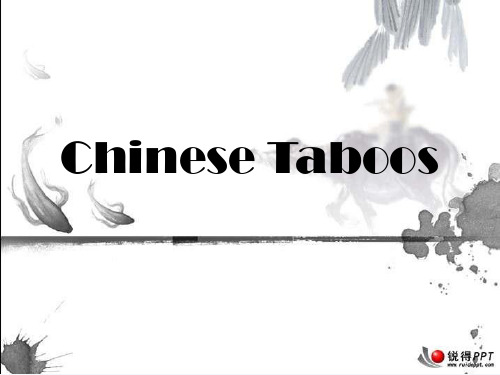
• And the position of the chopsticks when holding may depends the position where your husband’s home.
Now, I will introduce some Chinese taboos from the following aspects.
Chinese Taboos
The production, essence and functions of taboos
• Taboos are some actions that be forbid.
• The source of the taboos are the instinct to the horrific things, for example the animals, and the natural calamities.
• If a people pass away, we shouldn’t say that he is die, but choose other words replace.
Taboos in language
• Chinese people always avoid the negative things when speaking.
•
othing
•
Eating and drinking
•
Language
•
Gender
•
Wedding
Taboos in clothing
• People must select the clothes depend on the seasons.
中国禁忌文化@
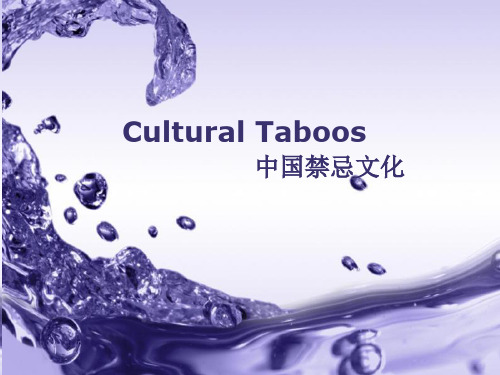
• widows They were considered to be ominous(不吉利的). • Nuns and Monks
In Hunan,it was said that if you encountered nuns or monks on New Year's Day,you would be unlucky a year.
Page 10
Taboos for objects
c chopsticks to hit the side of your bowl or plate to make a lot of noise, because Chinese people think only beggars would do this to beg food. 2. When you use chopsticks, don't stretch out your index finger, which would be regarded as a kind of accusation(谴责) to others. Never use chopsticks to point at others. 3. It is thought to be an impolite behavior when you suck the end of a chopstick. People will think you lack family education. Powerpoint Templates
• The ancestors’names(alive or dead)
Sima Qian's “史记” was used instead of“史谈”, just because his father's name was “司马谈”. By Tang Dynasty,people were not allowed to use ancestors' names of the monarchs for more than seven generations,even after they died.
跨文化交际之中英禁忌语比较
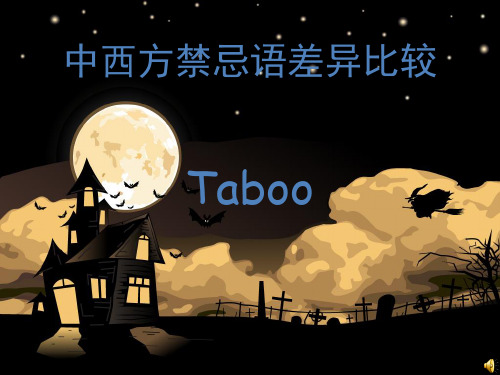
(二)词汇禁忌语
• 1 怀孕与生育 • 中西方都对怀孕、生育有一定的避讳。汉民族十分重 视后代繁衍,中国民间有“不孝有三,无后为大”的说 法,因此,生子添丁是大喜之事,但是由于怀孕与性行为 有关,加上旧时一些封建迷信思想,认为产妇不吉利,因 此无论孕妇本人还是他人对怀孕一事总是不便直说, 而是采用委婉语代指,诸如“有喜”、“有身”、“ 快要做妈妈了”之类。 • 英语国家的人可以比较自由地、公开地谈论女性的身 孕,甚至怀孕的女性本人也向异性直言其事。
What is Taboo?
Definition of Taboo
• 禁忌语的定义: • 原意是“神圣的”“不可接触的”“极其 注意的”东西。 • 在语言交际中,有一些词语是不能随便说 的,说出来就可能会引起听话人的不快和 反感,这就是语言学上所说的“禁忌语” • 禁忌语指人们在说话时,因不能、不敢或 不愿说出不愉快的联想色彩的词语。
• 4 “性” • 中西方文化都有禁忌,但方式和程度不同。汉民 族是比较保守的民族,无论是在公共场合还是在 日常生活中,关于性的词汇都是在禁忌之列。 • 在英美国家,性教育早已实施,性观念比较开放, 有部分词汇受到禁忌,如“同性恋”一词很少用 homosexual ,而多用gay或者queer 。
• 3 “疾病” • 生病是被看作是一种不幸(misfortune) ,它给人们 带来不适和痛苦。中西方文化中对疾病都比较忌 讳,病人本人不愿意提起,也不愿他人提起。 • 在美国,病人有知道自己真实病情的权利,如果病人 要求,医生则会直言相告。 • 在汉文化里,病情确实很重时,为减轻病人的负担, 医生和病人家属则倾向于向病人隐瞒病情。
• 5 数字 • 中西方文化对数字禁忌很不相同, 中西数字 禁忌差异及民族文化心理总体而言,汉民 族讲究对称,注重成双,喜联想吉祥,小 心或刻意躲避因语言同似或构字相关造成 的不祥意义的联想。而西方民族崇拜单数 ,追求独立,将由于宗教和神话传说影响 而不受欢迎的数字,如“13”“星期五”视若 蛇蝎。
中国饮食禁忌英文作文
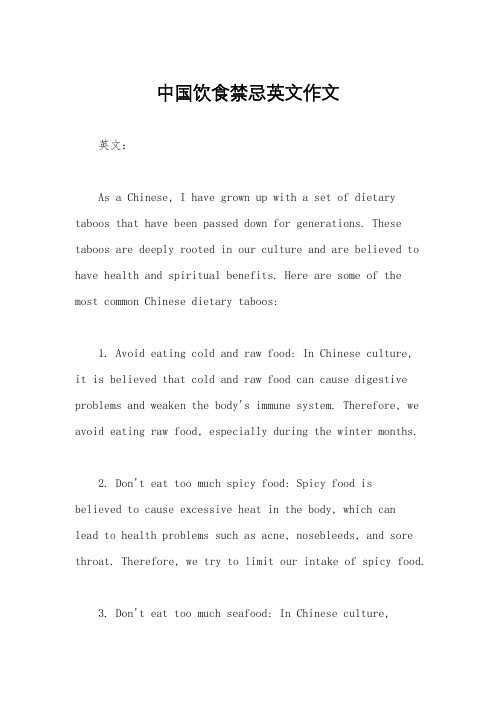
中国饮食禁忌英文作文英文:As a Chinese, I have grown up with a set of dietary taboos that have been passed down for generations. These taboos are deeply rooted in our culture and are believed to have health and spiritual benefits. Here are some of the most common Chinese dietary taboos:1. Avoid eating cold and raw food: In Chinese culture,it is believed that cold and raw food can cause digestive problems and weaken the body's immune system. Therefore, we avoid eating raw food, especially during the winter months.2. Don't eat too much spicy food: Spicy food isbelieved to cause excessive heat in the body, which canlead to health problems such as acne, nosebleeds, and sore throat. Therefore, we try to limit our intake of spicy food.3. Don't eat too much seafood: In Chinese culture,seafood is considered a "cold" food, which can cause digestive problems and weaken the body's immune system. Therefore, we try to limit our intake of seafood,especially during the winter months.4. Avoid eating certain types of meat: Some types of meat, such as dog meat and horse meat, are considered taboo in Chinese culture due to cultural and historical reasons. Eating these types of meat is seen as disrespectful and offensive.5. Don't eat certain types of vegetables: In Chinese culture, some vegetables, such as bitter melon and lotus root, are believed to have cooling properties, which can cause digestive problems and weaken the body's immune system. Therefore, we try to limit our intake of these vegetables.中文:作为一个中国人,我从小就接受了一套代代相传的饮食禁忌。
taboo
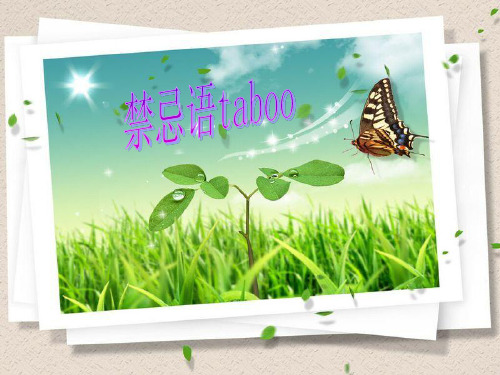
Of course, English-speaking countries p当eo然p,le 英sti语ll h国av家e的on人e们of还th有e 一gre个atest t最ab大oo的s 禁tha忌t ,is 那pe就rs是on个‘s 人pr的iva隐cy私. T。here is a在s英ay语in中g i有n E句n谚gli语sh:: AAmmaann’'ss home is hhiosmcaesitsleh.is(一ca个st人le的. (一家个就人是的他家的城堡。) M就e是an他s:的a城pe堡rs。on)‘意s h思o是me:is一s个acred and i人nv的iol家ab是le神, w圣ith不ou可t 侵pe犯rm的is,sio未n,经may not e许nt可er,. T不he得s入am内e。is个tr人ue的of事in也di是viduals d这o样no,t l不et必pe让op别le人k知no道w,,th更e 不mo愿re r别elu人c干tan预t t。o 询int问er关ve于ne个in人o的the年r 龄people. A﹑s财k a产bo﹑u工t th资e收ag入e﹑of婚pe姻rs﹑on恋al爱income, w﹑a宗ge教s,信pr仰op﹑er政ty,治m倾ar向ria等ge私、事、,、 love, r即eli是gio用n另, p一oli种tic方al式or侵ien犯ta了tio别n人a 的private m“a城tte堡r,”th。at is another way of violating other people's "castle."
Superstition and taboo
迷信和禁忌
英美社会中有一些常见的迷信说法和禁忌,如下: 1) To get out of bed on the wrong side means you will have a bad day. 下床方向错了,一天都不会顺利。 2) It is unlucky to have a black cat cross the road in front of you. 看见黑猫在你面前横穿马路是不吉利的。 3) The bride should not see the husband on the morning before the wedding. 在婚礼举行前的早上,新娘不应见自己的丈夫。
- 1、下载文档前请自行甄别文档内容的完整性,平台不提供额外的编辑、内容补充、找答案等附加服务。
- 2、"仅部分预览"的文档,不可在线预览部分如存在完整性等问题,可反馈申请退款(可完整预览的文档不适用该条件!)。
- 3、如文档侵犯您的权益,请联系客服反馈,我们会尽快为您处理(人工客服工作时间:9:00-18:30)。
Now, I will introduce some Chinese taboos from the following aspects.
•
Wedding
Taboos in wedding
• The date of wedding is important. • The bride must cover the head with a red
fabric, otherwise they may crash the gods. • And the bride should take some nuts in
Now, I will introduce some Chinese taboos from the following aspects.
•
Clothing
•
Eating and drinking
•
Language
•
Gender
•
Wedding
The taboos in gender
• The ancient Chinese people think that the blood of women is evil.
hand like the longans, to avoid the monsters.
• Sometimes some people may forbid eating something because of the belief or worship.
Taboos in eating and drinking
• Chinese people also think it is ominous that knock the bowl with the chopsticks.
• Taboos always make people think about something superstitious, but it can protect and help people in some situations.
Now, I will introduce some Chinese taboos from the following aspects.
• And the pregnant women is evil too.
Now, I will introduce some Chinese taboos from the following aspects.
•
Clothing
•
Eating and drinking
•
Language
•
Gender
Chinese Taboos
The production, essence and functions of taboos
• Taboos are some actions that be forbid.
• The source of the taboos are the instinct to the horrific things, for example the animals, and the natural calamities.
•
Clothing
•
Eating and drБайду номын сангаасnking
•
Language
•
Gender
•
Wedding
Taboos in eating and drinking
• Chinese people sometimes think that you may like the food you have eaten, in especial the children.
•
Clothing
•
Eating and drinking
•
Language
•
Gender
•
Wedding
Taboos in clothing
• People must select the clothes depend on the seasons.
• People should choose the right colors. • In some parts in China, people have to
• If a people pass away, we shouldn’t say that he is die, but choose other words replace.
Taboos in language
• Chinese people always avoid the negative things when speaking.
wear the clothes that must cover the body. • In Shandong province, the number of
buckles in the clothes must be the odd number.
Now, I will introduce some Chinese taboos from the following aspects.
•
Clothing
•
Eating and drinking
•
Language
•
Gender
•
Wedding
Taboos in language
• Chinese people always choose some lucky words to replace the unlucky words.
• If a soldier get injured in a war, the other people can’t say that he is injured.
